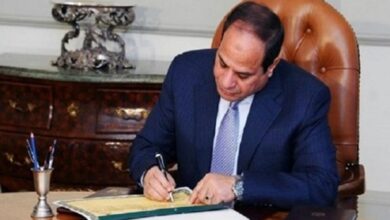News coverage for Monday, 4 October includes features marking the 6th of October 1973 victory over Israel and front-page content focusing on the much-anticipated and rapidly approaching November parliamentary elections.
Thus far, the lead-up to the poll has been marred by conflicts between political forces, accusations of rigging and favoritism, and a shadow of violence.
State-owned Al-Ahram runs a story that reports on a meeting between President Hosni Mubarak and Egypt’s governors, who have been in contact with cabinet officials in preparation for the parliamentary elections. According to Al-Ahram, Mubarak stressed in the meeting the need for adequate guarantees to ensure “integrity and transparency” in the electoral process and the highest possible voter turnout.
Al-Dostour’s editor-in-chief Ibrahim Eissa comments on the referenced safeguards in his column.
“President Mubarak insists in his statements nowadays that he has given instructions for the parliamentary elections to be transparent and clean without paying any attention to how dangerous these statements are,” writes Eissa. “Since when did integrity need instructions to be applied?”
“This means that the state is acknowledging that past elections were all rigged, and that it’s a matter-of-fact case for it to be rigged that it needs special presidential high-level instructions for it to be uncorrupted.”
“However, this will be one of the few times where the state institutions will not follow the president’s order,” he adds.
In Al-Ahram, a longer piece reports more in-depth coverage of the five-hour-long meeting between Mubarak and the governors, which, according to the state-owned paper, discussed “sectarianism and fundamentalism in order to protect unity [between Christians and Muslims in Egypt], increasing the treasury for shanty-towns, the 1000-villages program, monitoring public transportation system’s performance and wholesale markets,” among other things–all issues that remain pending. The paper suggests this meeting shows the government is now dedicating greater attention to the run-up to the poll.
Al-Ahram mentions that Mubarak, in response to a series of reports over corrupt state-owned land sales, “demanded that the extent of state-owned land be determined, that all provinces should put forth stringent rules for selling and managing it, while dealing firmly with those who try [illegally] to lay a hand on it.” Issues of less consequence, like cleanliness of cities and improving transportation, were also discussed, according to the coverage.
Meanwhile, Al-Shorouq covers a government plan to manage the distribution of butane gas through coupons, according to a Ministry of Social Solidarity source. Egypt has been experiencing a gas crisis recently. Butane gas cylinders–used for cooking by most Egyptians in poorer areas–are in severe shortage. As a result, black markets for gas are thriving and the cylinders have quadrupled in price in some areas.
The new regulations however are expected to set a ceiling to the total amount of subsidized cylinders a citizen is allowed to claim per year; for instance, households with less than three people will receive 18 coupons and those with more are entitled to 24. Those whose needs exceed the 24 coupon ceiling will have to buy the cylinders in the markets at unsubsidized “free” prices.
However, Al-Shorouq reports citing the anonymous ministry source, the new butane gas regulations will not be passed before the 2011 presidential elections, since giving such an issue media attention “is expected to [negatively] influence the popularity of the [currently ruling] National Democratic Party candidate ahead of the elections.”
In other news, Al-Shorouq marks the 6th of October military victory by publishing an excerpt of a rare radio exchange between two Egyptian pilots who fought in the war. The exchange occured during the initial air strike on enemy lines.
Egypt's papers:
Al-Ahram: Daily, state-run, largest distribution in Egypt
Al-Akhbar: Daily, state-run, second to Al-Ahram in institutional size
Al-Gomhorriya: Daily, state-run
Rose el-Youssef: Daily, state-run, close to the National Democratic Party's Policies Secretariat
Al-Dostour: Daily, privately owned
Al-Shorouk: Daily, privately owned
Al-Wafd: Daily, published by the liberal Wafd Party
Al-Arabi: Weekly, published by the Arab Nasserist party
Youm7: Weekly, privately owned
Sawt el-Umma: Weekly, privately owned




